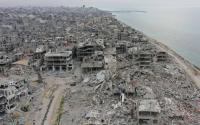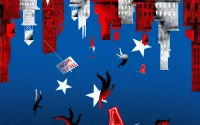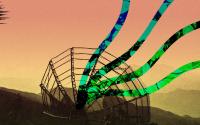14 June 2006Stewart Nusbaumer
According to Truthout's Kabul-based correspondent, war-scarred Afghanistan is an enigma wrapped in pain with a future that is anyone's guess."You don't know how bad it was." Ziah's eyes are dark and sharp, his voice pained. "Right here on the street," he glances out his living room window, "there were 56 dead bodies. They get all big from heat, smell horrible. We can't go out there with fighting everywhere. Later we bury them," he twists around in his chair and points toward a back window, "right up there on the hill."
After the Soviets were booted out of Afghanistan and their puppet government was dethroned in 1992, but before the Taliban took over Kabul in 1996 and established some order in the country, it was four years of bloody debauchery and sheer insanity. A decade since that vicious civil war, now in his mid-40s, Ziah continues to struggle.
"The Pakistanis let it be known that they would pay above market prices for used electrical wire, cable, plumbing." Ziah's eyes stretch, his left cheek twitches slightly.
"Why?" I ask, not understanding why Pakistanis would pay a higher price for used building material.
"To encourage Afghans to plunder and spread the destruction of their own country." His voice is harsh: "My house here nothing left - dig holes in floors, in walls, take everything!" He grabs a photo album on the table, flips through the thick volume and shows me a page with several photos of his gutted house. "The Pakistanis do this to hurt us even more."
Financial incentives for scorched-earth policy in Afghanistan directed from and paid by Pakistan, I'm not sure. I've witnessed the hope of getting money for one meal drive war-shocked people into wrecking a whole town. Still, Pakistan essentially created and strongly supported the Taliban, a nasty group that terrorized Afghanistan after a terrorizing civil war, and we know that war brings out the beastliness in humans. I'm sure Pakistan has its own Henry Kissinger. Every nation does.
The Confusion of War
Colonel Thomas X. Hammes, USMC (Ret.), author of The Sling and the Stone - a book that has taken American's national security establishment by storm - writes: "Even for a [guerrilla warfare] conflict, Afghanistan is unusually complex."
There is an endless list of local tribes and ethnic groups and family clans with warlords and drug lords and Islamic fundamentalists (from both inside and outside the country), all shifting alliances that transform yesterday's closest ally into today's mortal enemy. Coalition lineups are useless, since team rosters change by mid-week. Meanwhile, the central government struggles to maintain control of just Kabul. Both Afghans and foreigners agree that without the nearly 30,000 foreign troops in Afghanistan, the Hamid Karzai government would be dead by sunset.
This is a tribal society, not a nation state. Afghanistan has never been a nation state. That is what the international community is supposedly working on now.
Then there are the forever-meddling foreign states, with agendas that translate into serious trouble for Afghanistan. India wants Afghanistan strong to encircle its arch-enemy, Pakistan. Pakistan wants Afghanistan weak so arch-enemy India does not encircle it. Iran wants to curtail the power of Afghanistan's central government to protect its minority Shiite brethren. The United States wants to strengthen Afghanistan's central government just enough so US troops remain. Russia is hysterical that a strong or maybe a weak Afghanistan will stimulate unrest in its Muslim regions. China is paranoid that Afghanistan will ... well, Beijing is always paranoid.
It's a real mixture of neurotic states intervening in a devastated land whiplashed by its own tribal divisions and cutthroat tendencies.
Afghanistan has a long history of being headache-inducing, with domestic warring factions and scheming international entities and foreign dreamers if not robbers, with innumerable agendas backed by diverse powerful forces as centrifugal forces rip the country into pitiful martial shreds. While understanding war in Afghanistan is mind-blowingly difficult, the effects of war on Afghans are easy to understand. Horror is always simple to grasp.
The Horror of War
After the ten-year Soviet occupation went down in flames and the four-year Afghan civil war bloodied itself out, the order that the Taliban brought to Afghanistan was brutal and cruel. It was a "peace" based upon fear. For some Afghans, the Taliban peace was more brutal than the civil war.
Moving from their home base in the south, the Taliban conquered Kabul, the capital, then swept north and eventually brought 80 percent of the country under its control. In the north, the heartland of their enemy, the Taliban ravaged village after village. It killed and imprisoned men and boys, and carted off young women.
"They bring women from the north to here, " Ziah says with eyes stretched wide. "It was really terrible. They divide women into 15- to 20-years-old group, and into 20 to 25. Then they divide the virgins. Then they auction the women! They do that right here in Kabul!" His eyes are moist, cheek twitching faster. "You know -" he suddenly stops, turns his head toward the window. An SUV and several taxis whiz past, three Afghan men in traditional garb walk slowly by. Ziah looks at me hard, saying slowly: "You know, every rocket was a pain killer."
Every rocket was a pain killer. Every rocket was a pain killer - I get it! Every rocket that killed eliminated the pain of living - death is relief from unbearable pain. A depressing thought, except for those consumed by unbearable pain.
But Ziah was not killed; he lived. How about this: every rocket distracted Ziah from the pain of living - the bloating bodies in the street, the destroyed home, the women sold like cattle. Instead of death as relief from unbearable pain, it was fear as distraction and therefore relief from unbearable pain. But only for as long as the rockets continued.
Wait! Maybe Ziah is saying he wished he had been killed by a rocket, so now he would not be sitting here in front of me with his unbearable pain.
Rockets as painkillers, for killing or distracting, are the product of one twisted, gruesome mind. A mind snapped by war. I don't really know what Ziah means, except that it's not good.
Ziah has moved on and is now hunkering down in the present. "Don't trust anyone here," he says in a lower voice. "They're all spies, all the cab drivers. Watch yourself, they'll kill you. You have a gun, right?"
The Confusion of Peace
Walking back to my guesthouse, I pass a multi-story office building under construction on Chicken Street, then weave-dart across a congested road. Traffic jams are back - young men driving Toyota Corollas are everywhere. The past horrors of war have severely traumatized Ziah, which leads him to exaggerate present dangers. I nod to an elderly man; he responds with a nod and a broad smile. An outsider can often better see when serious danger has passed. Two young boys run up, playful. There is no doubt that Ziah's brutal history has made him paranoid today.
In my room, I check my email. There is one from SCG International Risk, an American security firm. An alert for Kabul!
SCG has recently received a number of threat reports of possible IED/VBIED (Improvised Explosive Device/Vehicle Borne Improvised Explosive Device) suicide attacks in Kabul city. According to the report, nine vehicles rigged as VBIED (Vehicle Borne Improvised Explosive Device) have entered the city and ...
The descriptions of the suspected vehicles are reported as follow:
1. Toyota Corolla/Red/Herat/2497 2. Toyota Corolla/Red/Herat/3261 3. Toyota Corolla/White/Kabul/7975 4. Toyota Landcruiser/Black/Heart/9367 5. Toyota Corolla Stationwagon/Red/Kabul/23128 6. Toyota Corolla Stationwagon/Black/Kandahar/2140 7. Pick-up Truck (Single Cabin)/White/Herat/2969 8. Toyota Corolla/-/-/2146 9. Toyota Corolla/Black/Khost/2141
--------
Stewart Nusbaumer is based in Kabul, Afghanistan. You can email him at [email protected].






